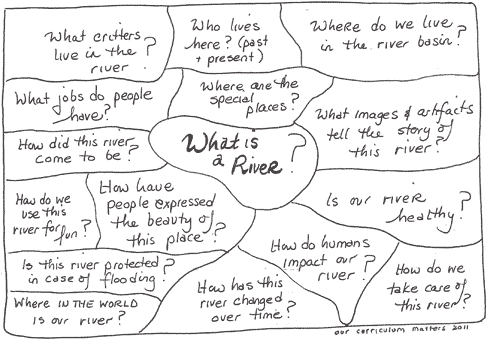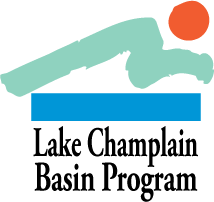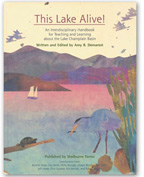A Watershed Has Many Stories
“The stories of the lake allow students a chance to understand their place in history and see how their actions---and the actions of those before them and around them--- influence the health of the lake and the flora and fauna of the area.”
Chris Shaffer, WEC teacher, 2008-2009
We take inspiration from John Elder who used the phrase “Stories in the Land” to encourage educators to listen to the stories our places have to tell.
When planning a curriculum in the context of a specific watershed, a teacher considers what stories to share with students. What stories will they hear? What stories will they learn to tell and create themselves? What stories will they find in the places they explore?
A teacher will decide—perhaps in consultation with students—what stories they will explore. While sometimes there are stories that teachers have to teach, some stories emerge unexpectedly from exploring local places.
Is it the human story of how people have lived on, used and worked the land and water of this region?
Is it the story of the little critters that live in the water that tell us how healthy the water is?
Is it the geology story? The ecology story? Is it the geography story?
If a watershed study is focused on a river, the questions might look something like this:

I see the story of the Lake Champlain Basin as a big quilt—all of the different pieces fitting together seamlessly to illustrate growth and change over time. I think that the greatest lesson that students can gain from exploring and learning about the Basin is a greater appreciation for the power and impact they hold as valuable and vibrant threads in the continuously evolving quilt of the Lake Champlain Basin.”
Erin Hopper, WEC teacher, 2010-2011-Final Reflection
Traditional school subjects sometimes frame the stories we learn.
This Lake Alive!, published in 1997 by Shelburne Farms, presents many subjects that tell the stories of Lake Champlain.
Subject-based chapters include Geology, Geography, Language Arts, Math, Human History, Nautical Archeology, Natural History and Ecology.
Chapters are in PDF downloadable format so that students can have their own "book" of local stories. Teachers can use these stories alongside a traditional subject study or design their own interdisciplinary unit based on the stories of the Lake Champlain Basin.


